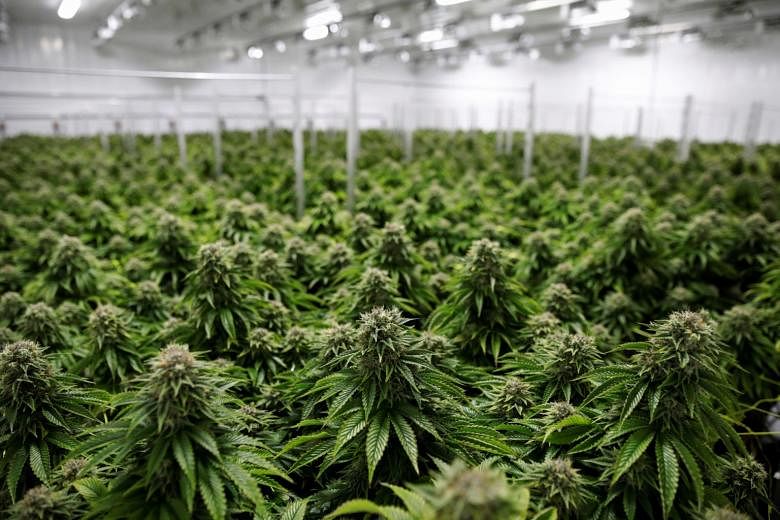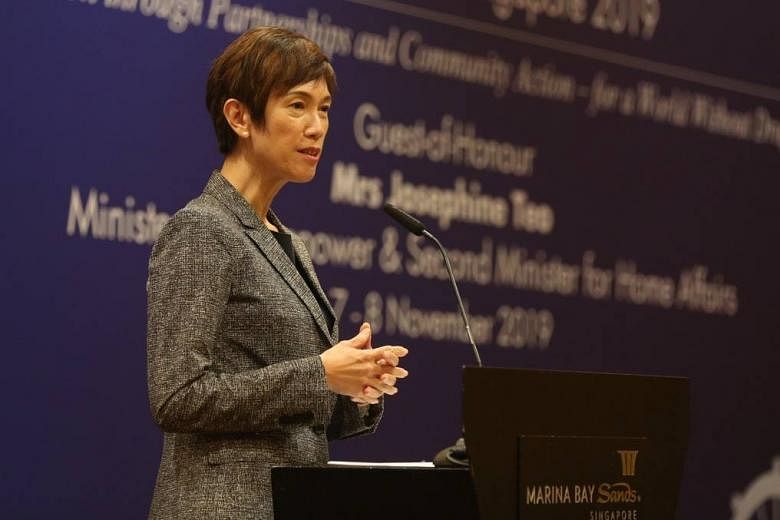SINGAPORE - The fight against drug abuse and the need to counter the proliferation of misinformation surrounding cannabis are critical measures that must be taken today, said Mrs Josephine Teo, Minister for Manpower and Second Minister for Home Affairs.
Mrs Teo, who was speaking at the Asia-Pacific Forum Against Drugs on Thursday morning (Nov 7), said that behind the misinformation and overseas campaign for the legalisation of cannabis are big corporations with the spending power to push for their agenda.
"If they succeed, the drug situation could become even more grim," she said at the conference co-organised by World Federation Against Drugs and the National Council Against Drug Abuse (NCADA).
According to the 2019 World Drug Report, one in every 18 people in the world had used drugs at least once in the previous year, which is a more than 30 per cent increase, compared to a decade ago.
She said: "Already, almost 12 million, or more than a third of young Americans, reported cannabis abuse in 2018. This is the highest level of cannabis use since 2002. With legalisation, these numbers will rise."
A concern among law enforcement, non-governmental organisations (NGOs) and anti-drug lobbyists is impressionable youths.
A 2018 survey by the Ministry of Home Affairs stated respondents aged 13 to 30 years old "generally hold a more liberal view on drugs, particularly cannabis".
While close to 90 per cent of those above the age of 30 agreed that cannabis abuse should remain illegal in Singapore, about 80 per cent of youth held this view.
The study said about 84 per cent of those above the age of 30 perceived the consumption of cannabis to be harmful, as compared to around 68 per cent of youth.
Outside Singapore in countries such as the United States, Canada and Uruguay, the liberalisation of cannabis has permeated communities and has targeted the young.
Mr Bob McCoskrie, one of the speakers at the conference, said cannabis-infused candies, nasal sprays, mineral water and vape liquids are prevalent, as well as petrol stations called "gas and grass" that sell marijuana.
He is the director of Family First New Zealand, which is campaigning towards a 2020 referendum to prevent the legalisation of cannabis in New Zealand.
He said big corporations know that if they get young people addicted to cannabis, "you'll get clients for life".
The danger of today's commercial cannabis is its purity.
"We're not talking about Woodstock weed," said Mr McCoskrie, who pointed out that THC or tetrahydrocannabinol levels in cannabis found today are more potent than previously.
The fallout is all too obvious. Since legalising cannabis, traffic deaths in Colorado involving motorists who tested positive for cannabis have more than doubled from 2013 to 2017.
In Los Angeles, Mrs Teo said, "the placement of a cannabis dispensary in 2014 was associated with a 250 per cent increase in homicides, and almost 50 per cent increase in robberies".
The cannabis market is projected to grow into a US$75 billion (S$102 billion) industry in global sales by 2030.
But the confusion of medical cannabis as a "miracle drug" needs to be debunked.
"What we are concerned about, is parties claiming that unprocessed or raw cannabis is 'medical cannabis'," said Mrs Teo.
"There is no scientific evidence of the safety and efficacy of raw cannabis use."
She explained that "medical cannabis" should refer only to cannabinoids - one of the compounds from the cannabis plant - that have had the safety and effectiveness tested in controlled clinical trials.
There is published research on the potential uses of cannabinoids to manage seizures and epilepsy.
"For such potential products, we can allow them to be sold by prescription, after experts have assessed their safety," said Mrs Teo.
Locally, Singapore prides itself on its tough stance on drug abuse and drug trafficking.
Dr Chew Tuan Chiong, vice-chairman of NCADA, said its national drug-control policy focuses on prevention, enforcement, treatment and rehabilitation.
Dr Chew said: "This drug-control strategy expresses the close partnership between the Singapore Government, NGOs and the community, without which it could not be effective.
"The Singapore model demonstrates how this tripartite configuration can and must work hand in hand."



